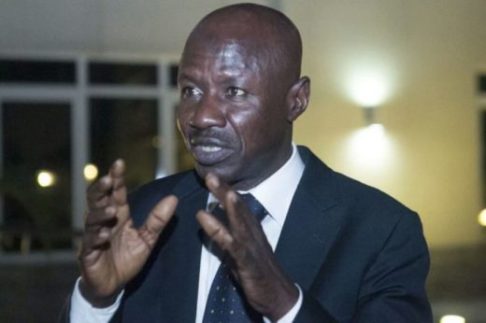Revealed: Magu Failed to Submit EFCC Audited Accounts for Four Years

The suspended Chairman of the Economic and Financial Crimes Commission (EFCC), Mr. Ibrahim Magu, failed to submit the audited accounts of the anti-graft agency to the National Assembly as required by law, THISDAY learnt at the weekend as critics say he took advantage of the non-confirmation of his appointment by the Senate to avoid accountability leading to his current woes.
By Section 37 of the establishment act, Economic and Financial Crimes Commission (Establishment, ETC) Act 2004, the commission is required to submit its report, including its audited account to the National Assembly every year.
It states: “The Commission shall, not later than 30th September in each year, submit to the National Assembly, a report of its activities during the immediately preceding year and shall include in such report the audited accounts of the Commission.”
Despite the refusal of the Eight Senate to confirm his appointment, first in December 2016, and later in March 2017, the agency was still required by law to submit its annual accounts as done by Magu’s predecessors, Mallam Nuhu Ribadu, Mrs. Farida Waziri and Mr. Ibrahim Lamorde in compliance with the establishment Act.
This faceoff with the Senate enabled Magu to operate the way he did without any scrutiny, a development that negated the practice of the commission under his predecessors, Ribadu, Ibrahim and Lamorde, who complied with the provision of the law by submitting their annual reports and audited accounts to the National Assembly.
Analysts told THISDAY at the weekend that the kind of financial fraud, Magu is being accused of could only occur in an unsupervised organisation, adding that had the EFCC put itself through the process of an independent audit, a number of the issues Magu is now being accused of might have been resolved.
The Senate had in December 2016 rejected Magu’s nomination as chairman of the commission on the strength of a damning security report by the State Security Service (SSS), which declared him unfit for public office, saying his credibility could not be guaranteed.
Rather than withdraw Magu’s nomination, the presidency represented him in March 2017. Again the Senate refused confirmation and resolved not to consider him again for the position.
The presidency responded by maintaining him in an acting capacity, arguing that it did not require Senate approval for Magu’s appointment since the establishment act requiring legislative approval was in conflict with the power of the president to make executive appointments under the constitution.
With the Senate resolving not to have any dealing with Magu, the commission became unable to present its annual report to the National Assembly.
Analysts said had the reports been filed all of the issues that are being raised now would probably have been detected by the National Assembly.
“With this kind of situation,” said one analyst, “Magu would appear to have operated without supervision by either the National Assembly or the Attorney General of the Federation and Minister of Justice, as the minister’s petition accusing him of insubordination has suggested.”
According to another analyst, this absence of legislative oversight would have been avoided if the presidency did not insist on having Magu as the boss of the anti-corruption agency.
Magu was accosted last Monday and taken before a presidential panel of enquiry led by Justice Ayo Salami, investigating allegations of corruption and insubordination brought against him by his supervising minister, Mr. Abubakar Malami. (Thisday)

